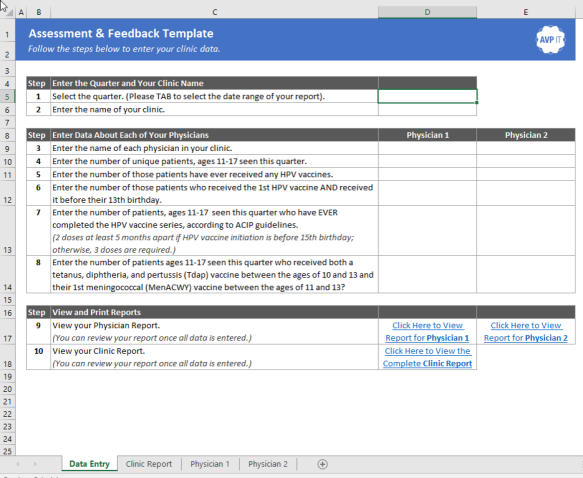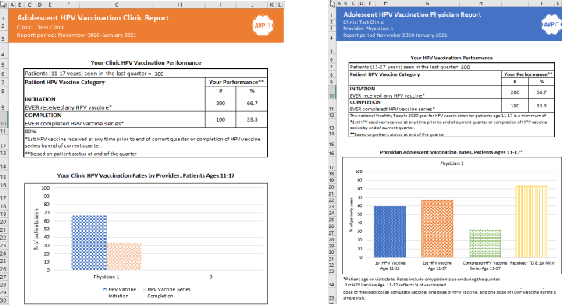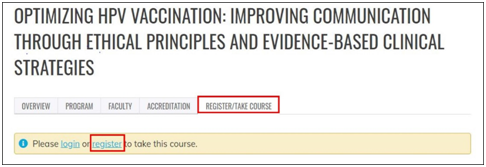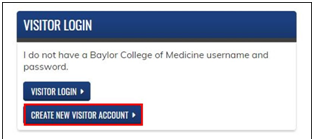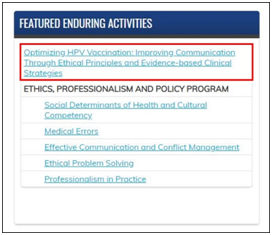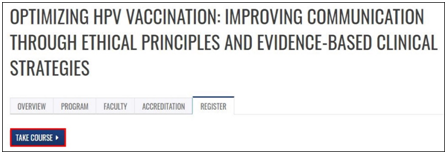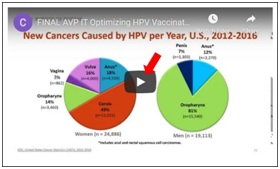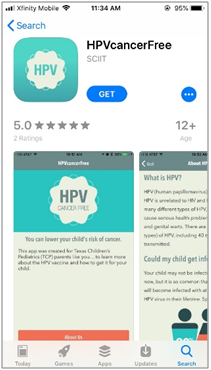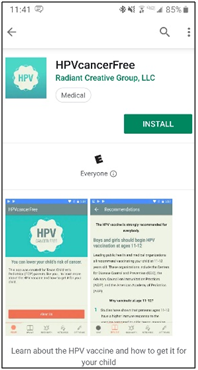My Toolkit
If you prefer to explore the strategies on your own, you can use this page to pick and choose which strategies you are interested in learning more about. The drop down menu for each strategy features an About, How-To, Tools, and Tips for Success section. Each of these sections contain vital resources that are available to you to help increase the HPV vaccination rates in your clinic.
| About | What an AVP Champion is and why your clinic should implement them. | view more |
| How-To | A step-by-step guide to identify an AVP Champion and begin AVP strategy implementation. | view more |
| Tools | A video to familiarize AVP Champions with the AVP and its strategies. | view more |
| Tips for Success | Helpful tips to successfully implement AVP Champions in your clinic. | view more |
| About | What Provider Assessment & Feedback (A&F) reports are and why your clinic should implement them. | view more |
| How-To | A step-by-step guide to produce and distribute A&F reports. | view more |
| Tools | Templates for automated production of A&F reports for each provider in your clinic. | view more |
| Tips for Success | Helpful tips to successfully implement A&F in your clinic. | view more |
| About | What the AVP Continuing Education is and why your clinic should implement it. | view more |
| How-To | A step-by-step guide to complete the AVP CE and promote it to your clinic staff. | view more |
| Tools | Resources to promote the AVP CE and track staff participation. | view more |
| Tips for Success | Helpful tips to successfully implement the AVP CE in your clinic. | view more |
| About | What Provider Prompts are and why your clinic should implement them. | view more |
| How-To | A step-by-step guide to implement Provider Prompts in your clinic. | view more |
| Tools | Example of Provider Prompt logic to identify eligible patients for HPV vaccination. | view more |
| Tips for Success | Helpful tips to successfully implement Provider Prompts for HPV vaccination in your clinic. | view more |
| About | What Parent Reminders are and why your clinic should implement them. | view more |
| How-To | A step-by-step guide to implement Parent Reminders in your clinic. | view more |
| Tools | Example of Parent Reminder logic to identify eligible patients for HPV vaccination. | view more |
| Tips for Success | Helpful tips to successfully implement Parent Reminders for HPV vaccination in your clinic. | view more |
| About | What the AVP Parent Education is and why your clinic should implement it. | view more |
| How-To | A step-by-step guide to promote the AVP Parent Education app to parents. | view more |
| Tools | Resources to promote the AVP Parent Education app and obtain buy-in from your clinic staff. | view more |
| Tips for Success | Helpful tips to successfully implement the AVP Parent Education app in your clinic. | view more |
The AVP CE*, titled “Optimizing HPV Vaccination: Improving Communication through Ethical Principles and Evidence-Based Clinical Strategies,” is a 1-hour video presentation with content comprising:
- How the principles of medical ethics apply to HPV vaccination
- The real and rising burden of disease associated with HPV infection
- HPV vaccination guidelines and coverage
- Clinical strategies (at a system, clinic, and individual level) that will help improve HPV vaccination rates
- Effective strategies to improve communication with parents about HPV vaccination
The CE presentation includes a brief post survey for CME** or CNE*** credits. The CE is suitable for all clinic staff involved in vaccinating adolescents, including physicians, nurses, and medical assistants. It will help providers deliver strong HPV vaccine recommendations and communicate effectively with parents about HPV vaccination. There is no fee for this activity.

TIP: The AVP CE is designated by Baylor College of Medicine for 1 hour of medical ethics**** Continuing Medical Education (CME) and by the Czik School of Nursing at The University of Texas Health Science Center at Houston for 1 hour of medical ethics Continuing Nursing Education (CNE) credit.
The CE can be accessed online on an internet accessible computer. The AVP CE has an audio track so speakers (and possibly headphones) may be required.
CE, CME, and CNE defined:
-
*
Continuing education (CE) refers to educational activities aimed to develop one’s knowledge, skills, and professional performance.
-
**
Continuing Medical Education (CME) refers to a specific form of continuing education that helps those in the medical field maintain competence and learn about new and developing areas of their field. CME credits are important to physicians because some states require a specified number of credits annually to maintain medical licenses.
-
***
Continuing Nursing Education (CNE) refers to educational activities specifically for nursing professionals. Most states require nurses to complete some form of continuing education every two to three years as a condition of licensure.
-
****
Medical ethics refers to credit hours in a specialized subject that physicians and nurses are required to take by the medical boards. Most states require physicians and nurses to take at least 2 hrs. of medical ethics or personal responsibility which highlight ethical frameworks in medical practice.
